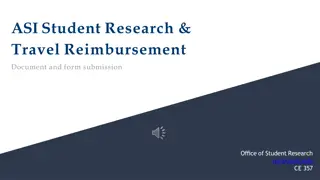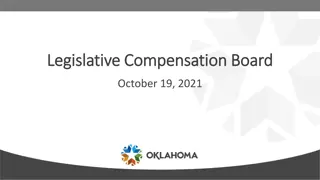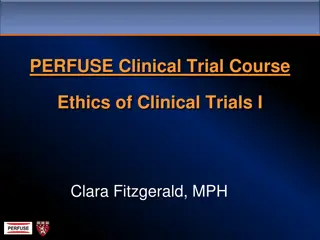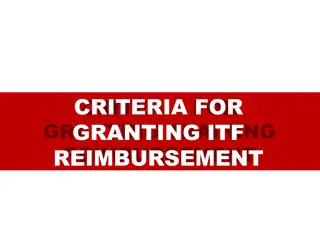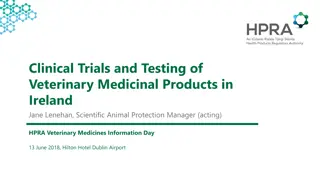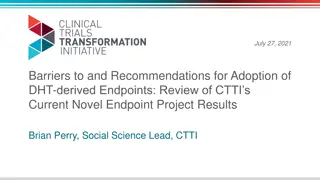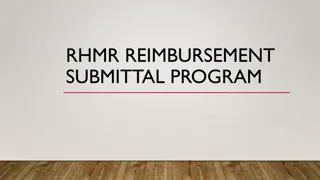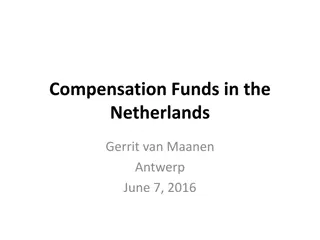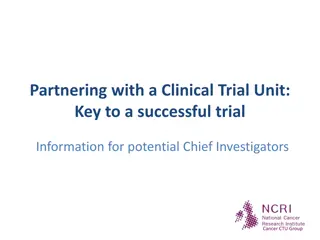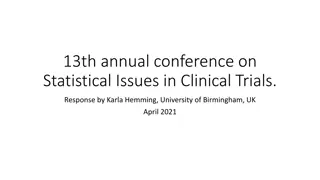Understanding Compensation and Reimbursement in Clinical Trials
Compensation in clinical trials can involve monetary benefits for participation or services for harm suffered. It is more common in Phase I trials with healthy volunteers. Reimbursement covers expenses like travel, accommodation, and loss of income for participants. Legislation in Europe varies on compensation practices, with a focus on transparency and ethical considerations. Specific compensation for harm is required only in cases of additional risk.
Download Presentation

Please find below an Image/Link to download the presentation.
The content on the website is provided AS IS for your information and personal use only. It may not be sold, licensed, or shared on other websites without obtaining consent from the author. Download presentation by click this link. If you encounter any issues during the download, it is possible that the publisher has removed the file from their server.
E N D
Presentation Transcript
European Patients Academy on Therapeutic Innovation Compensation in Clinical Trials
What is Compensation in Clinical Trials? European Patients Academy on Therapeutic Innovation Compensation in clinical trials can mean two distinct things: when participants receive monetary or other benefits for their participation in the clinical trial; or when participants receive a payment or other services when they suffer any harm from a clinical trial. Compensation is more common in Phase I trials with healthy volunteers and is paid to participants in recognition of their time sacrifice and as appreciation of their contribution for science. 2
Compensation for Participation European Patients Academy on Therapeutic Innovation Whether or not compensation is paid to participants depends on the sponsor and the given study. Many clinical research organisations (CROs) advertise participation in clinical studies as it offers a possibility to earn money. This practice is particularly common in the United States where the National Institutes of Health have a standard tariff for participation. 3
Reimbursement European Patients Academy on Therapeutic Innovation Reimbursement expenses refer to any expenses incurred in relation to participation in a clinical trial. Reimbursement is payable to all eligible participants or their legally designated representatives. This is documented before a clinical trial begins and may cover: travel expenses, accommodation, loss of income, meals. 4
Legislation European Patients Academy on Therapeutic Innovation The legislation and practices regarding compensation in Europe vary widely. Some countries exclude compensation entirely, but the most common practice requires that any compensation is reviewed and approved by the respective Ethics Committee. EU legislation says that no undue influence, including that of a financial nature, must be exerted on subjects to participate in the clinical trial. The EU Clinical Trial Directive (2001/20/EC) and Regulation (536/2014) state that no incentives or financial inducements are given to incapacitated participants, minors, (or either of their legally designated representatives), or to pregnant women, except for compensation for expenses and loss of earnings directly related to participation in the clinical trial. The EU requires all sponsors and CROs to be completely transparent about financial transactions made with participants or trial sites. 5
Compensation for Harm Suffered European Patients Academy on Therapeutic Innovation Regulation (536/2014) recognises that clinical trials do not always pose additional risk to the participants over normal clinical treatment. In such cases of no additional risk, or of negligible risk, no specific damage compensation, insurance or indemnity will be required. With respect to trials where there is additional risk and the sponsor is obliged to ensure adequate insurance coverage, the Regulation puts EU Member States under an obligation to set up a national indemnification mechanism on a not-for-profit basis. 6
The Informed Consent European Patients Academy on Therapeutic Innovation The Informed Consent signed by the participant must contain specific references to any compensation schemes, and the insurance coverage offered to the participants, should they suffer any injury or harm. The Informed Consent should also be specific about how the insurer can be contacted so that patients are not necessarily required to arrange their claims through the study personnel or the CRO. 7
Ethical Considerations European Patients Academy on Therapeutic Innovation Payments in clinical trials have raised ethical concerns for many years. The concerns focus on whether the payments are coercive or induce participants to take part in clinical research. This is an ongoing debate. 8
Vulnerable Populations European Patients Academy on Therapeutic Innovation Compensation is a special concern with vulnerable populations particularly in children and people with intellectual or mental disabilities. People in these vulnerable populations do not or cannot make their own decisions, so their parents/legal guardians decide for them. It is the member of the vulnerable population who carries the risk, but the parent or guardian gets the compensation. This is one of the reasons why the EU does not allow compensation to vulnerable populations or their legal guardians beyond the reimbursement of their expenses. 9
How Much Compensation? European Patients Academy on Therapeutic Innovation There are various models that help set the amount of compensation that participants may receive for taking part in a trial. Pandya and Desai (2013) describe 4 models: Market Model Wage Model Reimbursement Model Appreciation Model Ref: Compensation in clinical research: The debate continues. Perspectives in Clinical Research, 4(1), 70-74 Retrieved 28 August 2015, from http://www.ncbi.nlm.nih.gov/pmc/articles/PMC3601710/ 10
Models of Compensation: Market Model European Patients Academy on Therapeutic Innovation MODEL GUIDING PRINCIPLE DESCRIPTION ADVANTAGES DISADVANTAGES Market model Supply and demand Compensation given in studies that offer little-to- no benefits or with difficult-to-reach target populations -No compensation in studies that offer benefits or have a large target population Easier to achieve target recruitment numbers Less financial sacrifice by subjects High completion rates Can lead to high compensation rates in studies where subjects are difficult to find. High compensation may serve as undue inducement to participate. High compensation can lead to subjects neglecting the risks associated with participation, or may lead subjects to hide important data that might make them ineligible for the study. May create a situation of competition for subjects between investigators involving payment amounts. 11
Wage Model European Patients Academy on Therapeutic Innovation MODEL GUIDING PRINCIPLE DESCRIPTION ADVANTAGES DISADVANTAGES Wage model Egalitarianism Subjects that are involved with similar activities should be paid similarly Recognises that participation in research requires little or no skill but does involve time, effort, and discomfort by the subject. -Subjects thus paid on a scale parallel with that of unskilled but essential jobs Minimises issue of undue inducement Reduces inter-study competition Decreases financial sacrifice by the subject Prevents discrimination between high- and low-income groups Can create difficulties achieving target recruitment numbers Usually attracts low-income population Seen by some as an inappropriate commercialisation of research participation 12
Reimbursement Model European Patients Academy on Therapeutic Innovation MODEL GUIDING PRINCIPLE DESCRIPTION ADVANTAGES DISADVANTAGES Reimbursement model Egalitarianism Compensation should cover only those costs incurred by the subject for participating in the trial Time spent away from work may be reimbursed in proportion to the subject s earning capacity Minimises issue of undue inducement - Subjects are less likely to hide information Subjects are less likely to overlook risks involved in participation Decreases financial sacrifice Possible difficulty achieving target recruitment numbers Possible preference of low- income group due to high study costs incurred by selecting the high-income group 13
Appreciation Model European Patients Academy on Therapeutic Innovation MODEL GUIDING PRINCIPLE DESCRIPTION ADVANTAGES DISADVANTAGES Appreciation model Compensatio n to come at the time of study completion as a token of gratitude No real impact on study recruitment May have an impact on subject retention, might act as inducement to prevent a patient discontinuing participation Needs to be used along with one of the other models 14
References European Patients Academy on Therapeutic Innovation European Parliament (2001) Directive 2001/20/EC on the approximation of the laws, regulations, and administrative provisions of the Member States relating to the implementation of good clinical practice in the conduct of clinical trials on medicinal products for human use. Retrieved 8 October 2015 from http://eur- lex.europa.eu/legal- content/EN/TXT/?qid=1444311421932&uri=CELEX:3200 1L0020 15
References European Patients Academy on Therapeutic Innovation European Parliament (2014). Regulation (EU) No 536/2014 on clinical trials on medicinal products for human use, and repealing Directive 2001/20/EC. Retrieved 8 October 2015, from http://eur- lex.europa.eu/legal- content/EN/TXT/?qid=1444311608518&uri=CELEX:3201 4R0536 Pandya, M. & Desai, C. (2013). Compensation in clinical research: The debate continues . Perspectives in Clinical Research, 4(1), 70-74. Retrieved 28 August 2015, from http://www.ncbi.nlm.nih.gov/pmc/articles/PMC3601710/ 16


